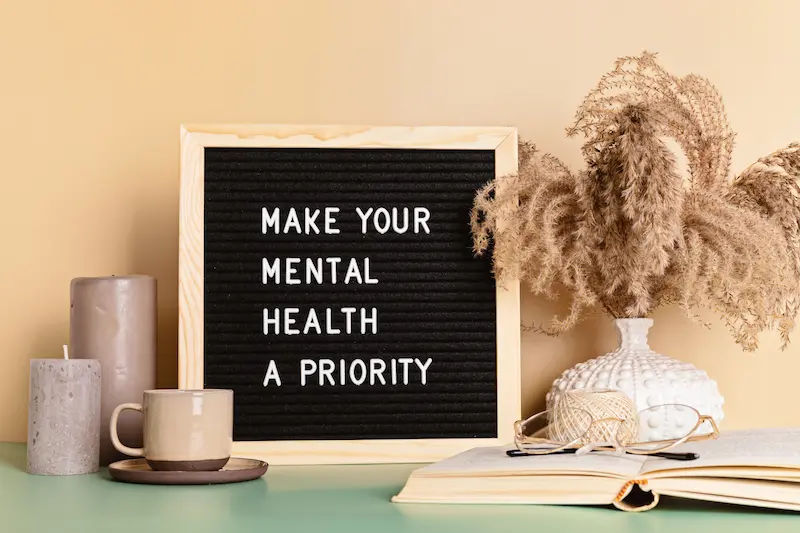Your Guide to Mental Health and Behavioural Sciences
Discover the connection between mental health and behavioural sciences. Learn about common disorders, effective treatments, daily wellness habits, and how to seek professional help.

Written by Dr. Vasanthasree Nair
Reviewed by Dr. Rohinipriyanka Pondugula MBBS
Last updated on 13th Jan, 2026

Introduction
Have you ever wondered why we think, feel, and act the way we do? The answers often lie at the intersection of mental health and behavioural sciences, a field dedicated to understanding the complex connection between our minds and our actions. This isn't just about treating illness; it's about unlocking the secrets to a healthier, more fulfilling life. Whether you're seeking to understand a personal challenge, support a loved one, or simply enhance your own well-being, this guide is for you. We will demystify common disorders, explore effective treatments like therapy and medication, and provide practical strategies for building mental resilience. Our goal is to empower you with knowledge and direct you to the right resources, because taking the first step towards understanding is the most powerful move you can make for your health.
What Are Behavioural Sciences?
Behavioural sciences are an interdisciplinary field that uses scientific observation and experimentation to understand why humans and animals behave the way they do. It combines elements of psychology (the study of the mind and behaviour), sociology (the study of social relationships and institutions), and anthropology (the study of human societies and cultures) to create a holistic view. Essentially, it moves beyond just the "what" of behaviour to explore the "why" and "how."
The Psychology of Our Actions
At its core, behavioural science is deeply psychological. It examines how our thoughts and emotions directly influence our actions. For example, a person with social anxiety (thought: "Everyone will judge me") may experience intense fear (emotion), leading them to avoid parties altogether (behaviour). By studying these patterns, behavioural scientists can develop interventions to break negative cycles.
The Link Between Brain and Behaviour
Modern behavioural science is deeply connected to neuroscience. We now understand that behavioural disorders often have a biological basis. Imbalances in neurotransmitters like serotonin and dopamine can significantly impact mood and motivation. This is why a comprehensive approach to mental wellness often involves addressing both the biological underpinnings and the learned behavioural patterns.
Consult a Psychiatrist or Psychologist for the best advice
Common Mental & Behavioural Health Disorders
A wide range of conditions fall under the umbrella of mental health and behavioural sciences. Understanding them is the first step toward de-stigmatisation and effective treatment.
Anxiety and Mood Disorders
These are among the most prevalent categories globally. They are characterised by persistent feelings that negatively impact one's ability to function.
Recognising Generalised Anxiety Disorder (GAD)
GAD is more than everyday worry. It involves excessive, uncontrollable anxiety about everyday things, often accompanied by physical symptoms like restlessness, fatigue, muscle tension, and sleep disturbances. It’s a constant state of "what if" that can be debilitating.
Understanding Major Depressive Disorder
Depression is a common but serious mood disorder that causes severe symptoms affecting how you feel, think, and handle daily activities. It's not just sadness; it's a loss of interest, energy, and hope, often lasting for weeks or months. If these feelings persist beyond two weeks, it is crucial to consult a doctor online with Apollo24|7 for a professional evaluation.
Behavioural Addictions and OCD
This category includes conditions where compulsive behaviours are the primary symptom. Behavioural addictions (e.g., to gambling, the internet, or shopping) activate the same brain reward circuits as substance addiction. Obsessive-compulsive disorder (OCD) is characterised by unwanted, intrusive thoughts (obsessions) and repetitive behaviours (compulsions) performed to alleviate anxiety.
Spotting the Signs: When to Pay Attention
Early intervention is key. Here are some signs that may indicate it's time to seek guidance from the field of behavioural sciences.
Emotional and Cognitive Symptoms
Persistent sadness, irritability, or anger.
Overwhelming fear, worry, or anxiety.
Confused thinking or reduced ability to concentrate.
Extreme mood swings.
Withdrawal from friends and activities.
Physical and Behavioural Changes
Significant changes in eating or sleeping habits.
Low energy or unexplained aches and pains.
Inability to perform daily tasks.
Increased use of alcohol or drugs.
Hearing voices or believing things that are not true.
The Pillars of Treatment in Behavioural Sciences
Treatment is not one-size-fits-all. It typically involves a multi-faceted approach tailored to the individual.
Psychotherapy: Talking It Through
Psychotherapy, or talk therapy, is a foundational treatment. It provides a safe space to explore feelings, thoughts, and behaviours with a trained professional. It can help individuals develop coping strategies and healthier patterns of thinking.
Cognitive Behavioural Therapy (CBT) Explained
CBT is one of the most effective and common forms of psychotherapy. It's based on the concept that our thoughts, feelings, and behaviours are interconnected. CBT helps individuals identify and challenge distorted negative thoughts and learn practical coping mechanisms to change unhelpful behaviour patterns. It's highly structured and goal-oriented, making it effective for anxiety, depression, and more.
Psychiatric Medication: How It Can Help
For many, medication is a vital component of treatment. Psychiatrists may prescribe antidepressants, anti-anxiety medications, or mood stabilisers to help correct chemical imbalances in the brain. Medication can reduce severe symptoms, making an individual more receptive to psychotherapy. It's important to remember that finding the right medication and dosage can take time and requires close supervision by a doctor.
Building Resilience: Daily Habits for Mental Wellness
Beyond clinical treatment, daily habits form the bedrock of long-term emotional well-being.
The Role of Nutrition and Exercise
The mind-gut connection is powerful. A balanced diet rich in nutrients can positively affect brain function. Regular physical exercise is a proven mood booster; it releases endorphins and reduces stress hormones. Even a daily 30-minute walk can make a significant difference.
Mindfulness and Stress Management Techniques
Practices like meditation, deep breathing exercises, and yoga anchor you in the present moment, reducing anxiety about the future. Mindfulness teaches you to observe your thoughts and feelings without judgment, which is a powerful skill for managing stress and preventing relapse.
Seeking Help: Your First Steps Towards Healing
Acknowledging you need help is a sign of strength. Here’s how to navigate the process.
How to Find the Right Mental Health Professional
You can start by talking to your general physician, who can provide a referral. You can also search directly for psychologists (provide therapy) or psychiatrists (are medical doctors who can prescribe medication). Platforms like Apollo24|7 allow you to find a therapist or psychiatrist online, read about their specialties, and book a convenient video consultation.
What to Expect in Your First Therapy Session
The first session is primarily an assessment. The therapist will ask questions to understand your history, current challenges, and goals. It's a chance for you to see if you feel comfortable with them. Remember, it's okay to ask questions about their approach and what your treatment plan might look like.
Breaking the Stigma: Talking Openly About Mental Health
For too long, silence and shame have surrounded mental health. Changing this narrative is a critical part of public health. Talking openly about our struggles normalises these experiences and encourages others to seek help without fear of judgment. Every conversation helps chip away at the stigma, making it easier for everyone to prioritise their mental wellness.
Conclusion
Navigating the world of mental health and behavioural sciences can feel overwhelming, but it’s a journey toward profound self-understanding and healing. We’ve explored how our thoughts and behaviours are deeply linked, identified common challenges, and outlined the powerful treatments and daily practices that can lead to recovery. Remember, mental health is not a destination but an ongoing process of maintenance and care. Whether you're taking the first step for yourself or supporting someone else, knowledge and compassion are your greatest tools. If the information here resonates with you and you recognise signs that you or a loved one may need support, don't hesitate to take action. Your mental well-being is worth it.
Consult a Psychiatrist or Psychologist for the best advice
Consult a Psychiatrist or Psychologist for the best advice

Dr. Jinesh Shah
Psychiatrist
20 Years • MBBS, MRCPsych (UK), CCT in Adult Psychiatry (UK), CCT in Child and Adolescent Psychiatry (UK), PG Diploma in Clinical Psychiatry (UK), Cert Hypnotherapy (UK).
Ahmedabad
Apollo Speciality hospital, Ahmedabad, Ahmedabad
(150+ Patients)

Dr. M Shyamala Devi
Psychologist
33 Years • DCH, MRCP, MRCH
Chennai
Apollo Children Hospitals Greams Road, Chennai

Ms. Debika Paul
Clinical Psychologist
8 Years • M.PHIL IN CLINICAL PSYCHOLOGY
Bengaluru
DEBIKA'S PRIVATE PRACTICE, Bengaluru
Mr. Vinay B
Psychologist
2 Years • MSc in Psychology Counseling
Bengaluru
Apollo Clinic, Sarjapur Road, Bengaluru

Miss. Vaishnavi Sankeshwar
Psychologist
5 Years • Msc Clinical Psychology
Bengaluru
Apollo Clinic, JP nagar, Bengaluru
More articles from Mental Health
Frequently Asked Questions
1. What's the difference between a psychologist and a psychiatrist?
A psychologist holds a doctoral degree (PhD or PsyD) in psychology and provides psychotherapy. A psychiatrist is a medical doctor (MD) who can prescribe medication and also provide therapy. They often work together.
2. Are online therapy sessions effective?
Yes, numerous studies have shown that teletherapy or online sessions can be just as effective as in-person therapy for many common conditions like anxiety and depression. They offer greater accessibility and convenience.
3. How long does it take for therapy to work?
It varies greatly depending on the individual and the issue. Some people see improvements in a few sessions, while others may engage in therapy for several months or longer. Consistency and openness are key factors.
4. Can lifestyle changes alone treat mental health disorders?
For mild symptoms, lifestyle changes can be incredibly powerful. However, for moderate to severe disorders (like major depression or OCD), they are most effective when combined with professional treatment like therapy and/or medication.
5. How can I help a loved one who is struggling but refuses to seek help?
Express your concern with compassion and without judgment. Listen more than you advise. Gently suggest resources and offer to help them make an appointment or accompany them. You cannot force them, but you can provide steady support.




